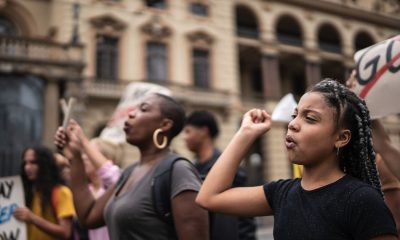Berkeley
Z Gallerie Accused of Racist Hiring Practices
Four Black Women File Lawsuit Against Furniture Chain
Z Gallerie, the luxury home furnishing chain store, calls itself the style authority for the fashion-forward home. But when it comes to its Black employees working at its Berkeley store, they call it a work environment that’s home to discrimination and retaliation against them , if they complain or bring awareness of mistreatment to management.
In a lawsuit filed against Z Gallerie by four African-American women who were former employees at they store, they all claim they experienced racial discrimination in the form of lack of promotion, disparate treatment and unlawful termination.
“Z Gallerie put them in a Catch-22 situation, putting the women in a situation where they were forced to resign or get terminated,”said Waukeen McCoy with the McCoy Law Firm that’s representing the plaintiffs. “I have seen race discrimination cases before, but this is one of the more extensive ones.”
Tanisha Alston, Camille Goode, Shelita Harper and Mikala Jackson are the plaintiffs suing the retail giant. They all worked at the Berkeley Z Gallerie store, located at 1700 4th St.
The lawsuit states that job opportunities at the store were not advertised to the Black plaintiffs and other people from outside the store were hired, even though the Black plaintiffs were interested in the promotions. Or the jobs from Z gallerie were advertised, but the Black plaintiffs, with more experience on the job and in sales, weren’t allowed to interview for the openings.
In one incident, Alston, who was the assistant manager at the store, was working as the acting manager, as the previous manager left the store. Without giving her a chance to apply for the managing position, Z Gallerie hired a store manager who was white. Alston had to eventually teach and train him on the duties of a store manager.
“These Black women, had a wealth of experience in retail and one in particular, was qualified enough to run a store,” continued McCoy “But time after time, they were passed over for promotion, by less qualified white employees.”
In another incident a Black employee was called “ghetto” by a white employee. In another incident Harper, who was hired as a sales associate, was told by a white manager that the Black employee that trained her, would never be a manager at the store. When this Black employee resigned later, two white employees gave each other high-fives, celebrating his resignation, in front of Harper.
The lawsuit details instances when Human Resources for Z Gallerie were notified about the problems at the store by management. Instead of being reprimanded, managers who harassed the black staff were often promoted.
When the plaintiffs felt they were being mistreated and they complained to Human Resources, they said their work hours were cut by the management. The lawsuit also states that the Black plaintiff were being asked by Z Gallerie managers to profile Black customers who came into the store. Making sure that Black patrons at the store didn’t steal and double-checking identificaiton if charges were made with credit cards were some of the tactics used. Charges of racial insensitivity at Z Gallerie are not new. In Dallas, Texas, in March of 2016, a celebrity financial adviser Arnitra Johnson-Hall was at a Z Gallerie store trying to buy a gift card at the store.
Even through the purchase was approved by her credit card, she left the store after a white store manager called the store security hotline on her. She wrote about it on her Facebook page, and the incident went viral prompting a response from Z Gallerie.
Z Gallerie responded by stating that, “discrimination, in any form is not in line with our company culture or values.” Calls to Z Gallerie’s corporate office in Los Angeles were placed, regarding the issues at the Berkeley location. They didn’t respond by press time.

Waukeen McCoy
McCoy said that he tried to get the issues resolved with the corporate offices in Berkeley and the national location in Los Angeles.
“We actually tried to resolve this with Z Gallerie,” continued McCoy. “We were ignored and that’s why we decided to file this lawsuit. Usually a company will respond, but it’s telling they didn’t.”
The lawsuit was filed in the Superiors Court of California in Alameda County. While Z Gallerie is headquartered in Los Angeles, the Berkeley store, is one of the flagship stores on the West Coast. The lawsuit is asking for general damages, as well as special and punitive damages for all the plaintiffs.
Arts and Culture
Farwest Region Deltas Celebrate Centennial With “September Breakfast” Honoring Vivian Osborne Marsh
The region was established in 1925 under the leadership of Vivian Osborne Marsh, who became its first Regional Director. Marsh was a pioneering scholar and civic leader, earning recognition as the first Black woman to receive both a bachelor’s and a master’s degree in anthropology from UC Berkeley.

By Antoinette Porter
Hundreds of members of Delta Sigma Theta Sorority, Inc., and their guests gathered at the Martin Luther King Jr. Student Union at the University of California, Berkeley, to mark the 100th anniversary of the sorority’s Farwest Region.
The region was established in 1925 under the leadership of Vivian Osborne Marsh, who became its first Regional Director. Marsh was a pioneering scholar and civic leader, earning recognition as the first Black woman to receive both a bachelor’s and a master’s degree in anthropology from UC Berkeley.
Marsh went on to serve as Delta Sigma Theta’s 7th National President, where she launched the sorority’s National Library Project to expand access to books in underserved Black communities in the South. During her presidency, the organization also became a prominent voice in the civil rights movement, lobbying Congress to pass anti-lynching legislation.
Bak in the Bay Area, Marsh devoted her career to advancing educational opportunities, mentoring young people, and strengthening community life. That commitment continues to shape the region, which supports initiatives in education, social justice, and economic development. Current projects include raising scholarship funds for students at Historically Black Colleges and Universities, voter education campaigns, and health and wellness programs.
A century after its founding, the Farwest Region of Delta Sigma Theta remains active across California and other western states, carrying forward Marsh’s vision of service and advocacy.
Arts and Culture
Cal Performances Presents Angélique Kidjo & Yo-Yo Ma in Sarabande Africaine at UC Berkeley Greek Theatre on Aug. 30
On Saturday, Aug. 30, the pair will debut the Bay Area premiere of Sarabande Africaine, joined by pianist Thierry Vaton, percussionist David Donatien, and special guest Sinkane. The program illuminates centuries of musical interplay between African traditions and Western classical forms, using the Baroque sarabande dance, and its African ancestor, the Congolese spirit dance Zarabanda, as a gateway to exploring the deep, interconnected roots of global music.

By Carla Thomas
On Labor Day weekend two of the world’s most celebrated musicians and cultural ambassadors, Grammy Award–winning vocalist Angélique Kidjo and legendary cellist Yo-Yo Ma join forces for an evening of music, history, and cultural dialogue at UC Berkeley’s historic Hearst Greek Theatre.
On Saturday, Aug. 30, the pair will debut the Bay Area premiere of Sarabande Africaine, joined by pianist Thierry Vaton, percussionist David Donatien, and special guest Sinkane. The program illuminates centuries of musical interplay between African traditions and Western classical forms, using the Baroque sarabande dance, and its African ancestor, the Congolese spirit dance Zarabanda, as a gateway to exploring the deep, interconnected roots of global music.
Both Kidjo and Ma have built careers not only as great performers but as passionate advocates for cultural understanding. Sarabande Africaine is as much a conversation about shared heritage as it is a musical performance, blending genres, geographies, and histories.
“Every day there are moments when all of us can feel we are on the inside of something and also when we feel we are on the outside of something,” said Yo-Yo Ma. “To be able to understand both at the same time and oscillate between the two gives us a larger perspective on the world.”
“If your mind is open, and there is no fear, it’s easier to listen, and to question yourself,” said Kidjo.
The upcoming performance is presented within Cal Performances’ Illuminations: “Exile & Sanctuary” series for the 2025–26 season. The production explores exile as more than just physical displacement, but a disruption in identity and belonging, while sanctuary represents both refuge and the creative space where new connections and communities can take shape.
Cal Performances’ Illuminations bridges performances with UC Berkeley’s academic research, pairing the arts with conversations about urgent global issues.
Kidjo’s continued partnership with Cal Performances includes her 2021–22 artist-in-residence, premiering her music-theater work Yemandja, set in 19th-century West Africa during the transatlantic slave trade.
She also participated in the Bias in Our Algorithms and Society panel alongside campus leaders like Jennifer Chayes, and joined the Black Studies Collaboratory for a dialogue on music, diaspora, and the world.
She has since returned to Berkeley for multiple performances, most recently in 2024 at Zellerbach Hall.
Yo-Yo Ma’s history with Cal Performances spans decades, beginning in 1997. One notable project includes the 2018 performance of Bach’s complete cello suites at the Greek Theatre, a testament to his devotion to creating “transformative concert experiences in iconic spaces.”
For tickets and more information, visit calperformances.org.
Activism
The Case Against Probate: False Ruling Invalidates Black Professor’s Estate Plan, Ignoring 28-Year Relationship
Zakiya Folami Jendayi, beneficiary of Head’s estate, states that “The errors, ranging from misstatements of fact, omissions of critical evidence, and reliance on false arguments and testimony, formed the basis of Judge Sandra K. Bean’s ruling against me, Dr. Head’s previous student, mentee, sorority sister and long-time friend,and despite the fact that I was her chosen, power of attorney, Advanced Healthcare Directive agent, trustee, executor and sole beneficiary.”

By Tanya Dennis
Part 5
In a shocking miscarriage of justice, a California probate judge issued a Statement of Decision on March 28 riddled with numerous documented errors that invalidated the estate plan of esteemed Black Studies professor Dr. Laura Dean Head.
The ruling from the Alameda County Superior Court’s probate division in Berkeley has sparked outrage from advocates for probate reform, community members and civil rights activists, who say the decision reflects deep flaws in the probate system, blatant disregard for due process, and the wishes of the ancestors. Judge Sandra Bean’s ruling reflects a repeated outcome seen in Black and Brown communities.
Zakiya Folami Jendayi, beneficiary of Head’s estate, states that “The errors, ranging from misstatements of fact, omissions of critical evidence, and reliance on false arguments and testimony, formed the basis of Judge Sandra K. Bean’s ruling against me, Dr. Head’s previous student, mentee, sorority sister and long-time friend,and despite the fact that I was her chosen, power of attorney, Advanced Healthcare Directive agent, trustee, executor and sole beneficiary.”
Reading court transcripts, the most egregious violations according to Jendayi reveal a pivotal point in the ruling that rested on a letter from Dr. Stephan Sarafian of Kaiser Permanente, who misidentified Dr. Head as male, misstated the day, month, and year, and asserted Head lacked capacity.
Under cross-examination, he reversed his opinion and admitted under oath that he never conducted a mental evaluation, did not diagnose Dr. Head with incapacity, did not write the letter, and stated he merely signed it “in case it was needed in the future.”
Despite Sarafian’s perjury, on Oct. 17, 2024, the California Court of Appeal upheld the lower court decision that relied on Sarafian’s discredited letter to invalidate Dr. Head’s estate plan, ignored Jendayi’s requests to impeach his testimony and dismiss Sarafian’s testimony and letter that both the Kaiser Grievance Department and the Medical Board of California denounced.
In her ruling, Judge Bean agreed with the false argument by attorney Leahy, which alleged that Jendayi provided the names of the beneficiaries to Head’s estate attorney, Elaine Lee. Bean made this decision despite Lee’s sworn testimony that Dr. Head had met with her alone, behind closed doors, and made the independent decision to leave her estate to Jendayi.
According to court records, Judge Bean reversed the burden of proof in the undue influence claim before any of Jendayi’s witnesses testified, forcing Jendayi to disprove allegations that were never substantiated by witnesses or records.
Bean ruled: “Respondent took Dr. Head to her apartment where she assumed complete control of Dr. Head’s day-to-day care, medical care, and all aspects of her life.” Jendayi proved that statement was false.
Bean also ruled that Respondent controlled Dr. Head’s necessities of life, food, and hospice care, despite zero testimony or documentation supporting any of those claims.
The court reduced Jendayi’s role to “a friend who, at best, cared for Dr. Head during the final two months,” totally ignoring 28 years of friendship, testimony, evidence, letters of recommendation, emails, and medical records.
Exhibits confirming Dr. Head’s intent and capacity, including the discredited medical letter, Exhibit 90, were omitted or misrepresented in the judge’s final decision.
Jendayi says, “The injustice within the probate justice system is devastating, traumatizing and financially depleting. It’s nothing short of legalized crime!”
Jendayi is now appealing to the Supreme Court of the U.S. with a petition citing denial of due process, judicial misconduct, and systemic bias in probate courts.
-

 Bay Area4 weeks ago
Bay Area4 weeks agoPost Salon to Discuss Proposal to Bring Costco to Oakland Community meeting to be held at City Hall, Thursday, Dec. 18
-

 Activism4 weeks ago
Activism4 weeks agoMayor Lee, City Leaders Announce $334 Million Bond Sale for Affordable Housing, Roads, Park Renovations, Libraries and Senior Centers
-

 Activism4 weeks ago
Activism4 weeks agoOakland Post: Week of December 10 – 16, 2025
-

 Activism4 weeks ago
Activism4 weeks agoOakland School Board Grapples with Potential $100 Million Shortfall Next Year
-

 Activism4 weeks ago
Activism4 weeks ago2025 in Review: Seven Questions for Black Women’s Think Tank Founder Kellie Todd Griffin
-

 Arts and Culture4 weeks ago
Arts and Culture4 weeks agoFayeth Gardens Holds 3rd Annual Kwanzaa Celebration at Hayward City Hall on Dec. 28
-

 Advice4 weeks ago
Advice4 weeks agoCOMMENTARY: If You Don’t Want Your ‘Black Card’ Revoked, Watch What You Bring to Holiday Dinners
-

 Activism4 weeks ago
Activism4 weeks agoAnn Lowe: The Quiet Genius of American Couture























































